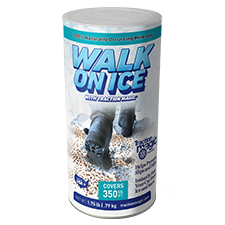Types And Causes Of Concrete Deterioration

Concrete is a durable material, but it isn’t immune to deterioration. Concrete can experience several types of damage that can weaken or even ruin the structure. This article will cover some common forms of concrete degradation and what causes them so that you can protect your surfaces from these problems. We will also discuss what ice melt is safe for concrete.
Corrosion Of Embedded Metals.
Embedded metal is a common feature of concrete construction. These metals may be rebar, wire mesh, or other types of reinforcement. The corrosion of embedded metal can cause deterioration of concrete structures.
Embedded steel in concrete can be susceptible to corrosion when exposed to moisture and oxygen for long periods.

Thermal And Volume Change.
Concrete is a brittle material and is more prone to cracking in cold weather than in hot. This is because the volume of the water that makes up the concrete will expand when it freezes, causing cracks. In hot weather, the opposite happens, and your concrete could crack from shrinking.
Cracking.
You may have experienced the frustration of cracking concrete.
Concrete is a strong material, but over time cracks can form because of many factors, including temperature changes and poor installation methods. These cracks will appear as small lines or large fissures that can make your home look unsightly and also cause damage to your foundation if they swell over time.
The chemical attack by chlorides, sulfates, acids, alkalis, and more.
The chemical attack by chlorides, sulfates, acids, alkalis, and more. The most common chemical attack agents on concrete are sulfates and chlorides because they are used in deicing salts and highway de-icing chemicals. These chemicals can cause concrete deterioration during the winter months when moisture is present.
What Ice Melt Is Safe For Concrete
The best way to choose the right deicer for your concrete surface is to do as much research as possible. Check the label of each product and make sure it lists concrete as a suitable surface. If you are unsure about the safety of any particular product, don’t use it.
Read all instructions carefully before applying any deicing agent to your driveway, sidewalk, or patio. Make sure that all precautions have been taken into account before you apply this material to avoid damage to yourself or others who may be exposed to it later on down the road. We recommend not to use any ice melt for new concrete
100% salt & chloride-free, fast acting Ice Management Solution
Conclusion
Concrete deterioration is a serious issue, and deicers can be harmful to your concrete surfaces. The best way to mitigate this problem is by doing extensive research into the different types of deicers available. Hope you’ve got your answer to your question— what ice melt is safe for concrete? By understanding the risks associated with each type of deicer, you can make an informed decision about what products will work best for your needs.
Try Also Our Other Winter Safety Products:
Safe Paw
The Original and #1 Selling Pet and Child Safe Ice Melt for over 20 years. Guaranteed environmentally safe –It won’t harm animals or children, and it won’t damage your property. That’s Safe Paw. Safe Paw can change how winter affects our planet.

Walk On Ice
The handy disposable canister can be taken everywhere, with the same 100% naturally occurring minerals that provide instant traction on ice or snow. Use it on sidewalks, steps, or as an instant traction agent for your car.


